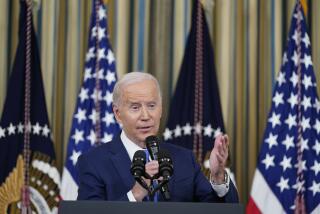Asia Should Stick With Reforms
- Share via
Officials from 21 nations are trekking to Kuala Lumpur, Malaysia, to spend the next 10 days sorting out regional economic policies and priorities. This year’s meeting of the Asia-Pacific Economic Cooperation organization, known as APEC, occurs as the region struggles to recover from the economic tidal wave that leveled South Korea, Malaysia, Indonesia and other Asian nations.
APEC members face temptation to retreat from the group’s commitment last year at Vancouver to open markets and create an Asia-wide free trade zone by 2020. They also would prefer to put off additional fiscal and monetary reforms; millions of citizens were thrown back into poverty, in part because their governments had to impose austerity measures required by the International Monetary Fund to secure loans.
Any retreat from open markets would further hurt the United States. American companies already are experiencing a significant slowdown in sales to Asia. Delaying planned tariff reductions in chemical, telecommunication, forestry and six other specific industries would only make things worse. Cheaper Asian goods are also making it harder to sell American-made products worldwide. As a result, the United States could have its worst trade deficit in a decade.
Turning inward or resorting to currency controls, as proposed by Malaysia’s unpopular Prime Minister Mahathir Mohamad, is not the solution to Asia’s problems. A better option would be to develop social safety nets and secure Western food aid for troubled countries while they work their way through their financial problems. President Clinton reportedly is working on such a plan. APEC could also build on recent proposals by the Group of Seven industrial nations to provide a new credit line to countries that are pursuing appropriate but sometimes difficult policies, such as improved financial-sector regulation and accountability.
A year ago, APEC members understated the extent of the financial crisis. The task now is to return to a growth mode by keeping markets open and assisting the worst-hit nations with their reforms.
More to Read
Sign up for Essential California
The most important California stories and recommendations in your inbox every morning.
You may occasionally receive promotional content from the Los Angeles Times.













